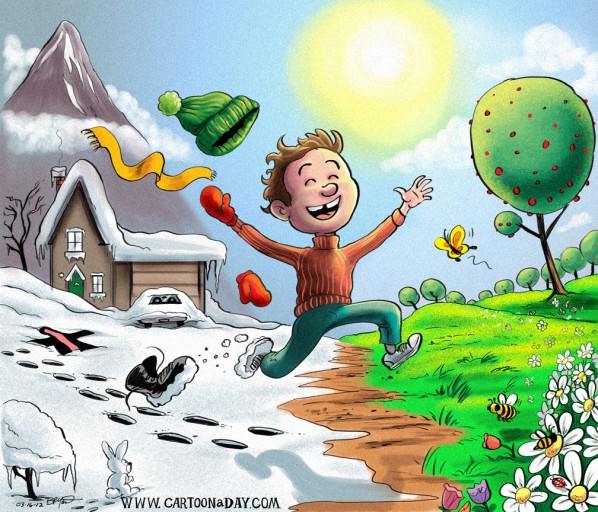This week I decided to do something about it.
Last week I said I didn't have the answers to the problems I raised.
This week I tried looking for some. Over the next few weeks I'll do a few mini-blogs on each of the areas I raised during my last post, which will become more and more specific hopefully, and more and more useful.
Here's what I came up with. Please, if you're serious about maintaining your own health, may I first urge you to do two things in response to this post:
1) Have a go at some of these things, and give me some feedback on how you feel as a result: Does it work for you?
2) Please post some ideas at the bottom which you've tried, so the rest of us can try them. We're using this notion of collaborative working through Twitter et al to improve our teaching, so why should it not work to help us find solutions to over-working?
So here we go...
The first point I talked about last week was our seeming inability to obey our seasonal rhythms. I went away and tried to find something which was always very sensible advice when I used to train many years ago, and finally found it. They still ring true for me.
If you read my last blog (here), you'll notice that in TCM we talk about the 5 element system, which has correspondences in every area, including our own bodies (emotions, mental state, organs etc) and the outside world. Each element therefore has a season associated with it, and the nature of the element reflects the sorts of things we should be doing in each season to live in harmony with nature and not struggle against it so much.
Let's start with the element of Fire. Fire is the element associated with Summer (more detail here):
Ways to tend your inner Fire
- Have fun on a regular basis, even if you have to work at it at first. Make it a priority - schedule your fun, if that's what it takes. Don't compromise. Consider fun as important to your well-being as work or anything else you do.
- Give of yourself to others. Take the time to listen. Take the risk of dipping into your own heart and finding what you have to give to others unconditionally - then just do it.
- Live your passion, whether it be the church choir, rollerblading, preserving the environment, or writing poetry. If you don't know what your special passion is, be willing to admit that you don't. Meanwhile, stay amused and don't stop looking. When you find that great interest, dive into it wholeheartedly and enjoy!
- Get physical. Get into your body and out of your head. Love, exercise, dance, run, play. Get your circulation going.
Earth is the element associated with Late Summer, and this is what its associations are:
Suggestions for living in harmony with the late summer season
- Enjoy the abundance of fruits and fresh vegetables
Be aware of their special qualities, each succulence different from the next. Carrots are crisp, cucumbers cool, tomatoes luscious, peaches sweet. Look at the seeds, and reflect on the fact that within each harvest lie the seeds of the next. - Be thoughtful of how you can nourish others.
In this season when nature gives her bounty, we also rejoice in giving, with attention to the special needs of others. You need not wait until you can give a "great gift." A word, a courtesy, a thoughtfulness - given today - is a great gift. - Be conscious of the harvest of your life.
Think about yourself, your relationships, and your work. What parts of your life are bearing fruit? Where is the harvest rich? Where do you find it stunted? - Consider what you need to do to make ready for the letting go of autumn.
Holding your harvest in mind, ask what is overgrown or unneeded. What distracts you from your dearest concerns? What might you wish to simplify in yourself or in your life?
Metal is associated with the Autumn season:
Suggestions for living in harmony with the autumn season:
- Go through your closet, desk, garage, medicine cabinet - any cluttered storage area-and discard what you no longer need. Then donate, sell, or otherwise circulate what might be of value to others.
- Do a mental inventory: Examine attitudes (prejudices, envies, hatreds, jealousies, resentments) stored within your psyche. When possible, contact those with whom you harbor old "stuff." Attempt to resolve the hurtful old issues, and then let them go.
- For issues you cannot resolve directly with others, or for old issues with yourself, write them on paper, being as specific as possible. Then burn the paper, symbolically releasing the content.
- Take time each day to breathe slowly and deeply. As you inhale the clean autumn air, feel yourself energized and purified. Feel the old negativity, impurity, and pain leave your body and psyche. Then contemplate briefly who you are without these identifications.
Finally, Water is the element associated with Winter:
Suggestions for living in harmony with the winter season
- Get more rest.
This is nature’s season for rest, repair, and regeneration—a phase important for our next cycle of growth. The Nei Ching,oldest-known document of Chinese medicine, advises: “[In Winter], people should retire early at night and rise late in the morning, and they should wait for the rising of the sun.” - Schedule more time for your inner life.
Use the energy of the season to discover more about yourself through reflection, reading literature that “restores the spirit,” being more aware of your senses, paying attention to your dreams. The winter season is an especially good time to begin the practice of meditation. - Choose more “warming” foods.
As the weather cools and the body needs to generate more warmth, include more cooked foods and complex carbohydrates in your meals. Try dishes made with whole grains, squashes, beans, peas, and root vegetables such as potatoes, carrots, and garlic. - “Gather around the hearth” with people who mean the most to you.
Winter evenings are an especially good time to rejuvenate and deepen relationships with those closest to you. Keep gatherings simple and relaxed.
And finally, let's talk about the present. Spring has finally sprung, and it is associated with the Wood element. You can read its key associations in much more detail here. However, here are a few things TCM philosophy recommends you can do to make the most of Spring's energy...
Suggestions for living in harmony with the spring season
- Begin your day early, with a brisk walk.
Feel the sunshine pull you up and out, like the plants and animals. Watch buds rush into leaf, often doubling their size in a day. Look for birds' nests - you'll find them everywhere, even on top of air conditioners. Feel the life within you, like that outdoors, thrust up out of darkness into new possibilities. Make a garden. Eat greens. - Begin new things - at home, in your work, and in yourself.
In this season when nature reinvents itself, we too can see people and situations with new eyes. Let new tissue grow over old hurts, and take fresh hope. Be creative. Make things, do things. Begin! - Consider how you wish to make ready for your summer harvest.
Spring does not last forever. Use its bountiful energy wisely, so that the crops you sow - again, in yourself, in your work, and in your life - are those you wish to harvest. The energy of spring brings vision.
So there you are. Not rocket science. Just a way of making sure we're not fighting our environment too much. My experience (when I choose to listen to it!) has always shown me how much easier my life is when I don't struggle to overcome what is going on around me, and go with the flow. It is a wise teacher, and in Spring, it is reminding me that I'm as much a part of nature as everything else.
Good luck. Hope you haven't all turned into tree-hugging screaming hippies by the end of these blogs! And let me know how you get on...




